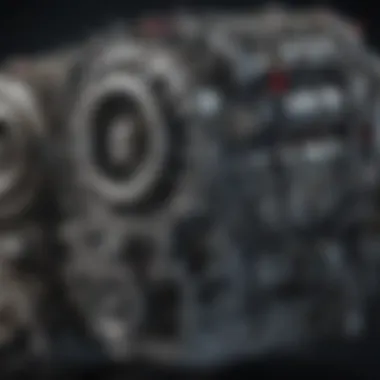A Comprehensive Guide to Detroit Diesel Parts Lookup


Intro
The process of sourcing and identifying parts for Detroit Diesel engines is crucial for both performance and reliability. Understanding how to navigate the complexities of parts lookup can save time, money, and frustration for industry professionals and enthusiasts alike. In this guide, we will explore best practices for accurately identifying parts, the available resources for efficient lookup, and the technological advancements that facilitate these processes. Our aim is to empower readers with valuable insights, ensuring that they can maneuver through the intricacies of sourcing Detroit Diesel components effectively.
Accurate parts identification not only contributes to smooth operations but also ensures the longevity of the engine. With the right knowledge, individuals can make informed purchasing decisions that optimize their investments.
Research and Data Analysis
Current Trends in Detroit Diesel Parts
The landscape of diesel engine components has seen significant shifts in recent years. Key trends include a growing emphasis on precision in manufacturing and the integration of technology into parts production. This has improved the quality of Detroit Diesel parts, making them more reliable and efficient. Companies are also adopting more standardized components to simplify the lookup process.
Statistical Insights into Parts Availability
To understand the availability of Detroit Diesel parts, it's crucial to analyze market statistics. With a surge in production and use of diesel engines in various sectors, the demand for components has increased correspondingly. Recent studies indicate that about 60% of engine failures are linked to faulty parts. This data underscores the importance of ensuring correct part identification and timely procurement.
Best Practices and Techniques
Efficient Parts Identification Strategies
To identify the proper parts for Detroit Diesel engines, consider these strategies:
- Utilize Manufacturer Catalogs: Access the official Detroit Diesel parts catalogs. They provide comprehensive listings and diagrams.
- Model and Serial Number Retrieval: Always have the engine serial number and model type ready. This information is vital during the lookup process.
- Cross-Referencing: Use cross-reference tools to compare parts with compatible options. This can help find alternatives if certain parts are unavailable.
Optimal Purchasing Techniques
When it comes to purchasing parts, following some best practices can lead to better outcomes. Consider these points:
- Research Reputable Suppliers: Ensure you are purchasing from established suppliers who specialize in Detroit Diesel products.
- Check Reviews and Ratings: Before making a purchase, research the supplier online to assess their reliability through customer feedback.
- Take Advantage of Bulk Purchase: Buying in bulk can lead to cost savings, especially for commonly used parts.
Technological Advancements in Parts Search
Recent innovations in technology have significantly streamlined parts lookup. Various online tools and databases are available for identifying and ordering components. Advanced search functions and visual aids are essential in making the process efficient.
Computer software solutions that integrate with manufacturers’ databases can improve the accuracy of parts identification. They provide real-time information on availability, ensuring that users can make educated decisions swiftly.
"Accurate parts lookup is critical. It ensures both efficiency and reliability in operations that depend on Detroit Diesel engines."
In addition, mobile applications for parts lookup provide convenience and accessibility. They allow users to access critical information on the go, which can be especially useful in the field.
End
A thorough understanding of the Detroit Diesel parts lookup process equips industry professionals and enthusiasts with the tools needed for effective sourcing. Accurate identification ensures the longevity of engines while optimizing operational efficiency. By utilizing efficient identification strategies, adapting to technological advancements, and employing sound purchasing techniques, users can better navigate the complexities of Detroit Diesel components. []
Understanding Detroit Diesel Components
Understanding the components of Detroit Diesel engines is fundamental for anyone involved in maintenance or parts procurement. Each part plays a critical role in the performance and efficiency of the engine. Knowing the components, their functions, and how they interact can save time and resources.
Overview of Detroit Diesel Engines
Detroit Diesel has a reputation for producing robust and efficient engines that serve various industries, including agriculture, transportation, and construction. These engines are designed for reliability and longevity. Understanding their basic operation equips maintainers and operators with insights for troubleshooting or enhancement.
Many vehicles and machines rely on Detroit Diesel engines, making knowledge about these engines vital. Common uses include powering trucks, buses, and heavy equipment. A good grasp of engine components aids in optimizing performance and extending the life of the equipment.
Key Parts and Their Functions
Understanding key parts facilitates effective maintenance and ensures compatibility when procuring parts. Three vital components include the engine block, pistons and rings, and cylinder heads. Each part has distinct characteristics and functions, contributing to the overall performance of the engine.
Engine Block


The engine block serves as the foundation of any Detroit Diesel engine. It houses many critical components, including cylinders and crankshafts. The block's structure must withstand high pressure and temperatures, making durability a key characteristic. Often made from cast iron or aluminum, it ensures efficient heat dissipation.
A robust engine block enhances stability and longevity, making it a vital choice in diesel engines. Its design often incorporates water jackets for cooling, which is essential in heavy-duty applications. However, the block's weight can be a disadvantage in some applications, affecting overall vehicle weight.
Pistons and Rings
Pistons and rings are integral to the combustion process. They create a seal within the cylinder, allowing for efficient compression and expansion. The key characteristic of pistons is their ability to withstand extreme pressures generated during combustion. Piston materials often include aluminum alloys for lightweight and strength.
The design of the piston rings is crucial as well. They prevent oil from entering the combustion chamber, which is essential for maintaining engine cleanliness and efficiency. A unique feature of pistons is the inclusion of cooling channels, which help maintain optimal temperature. However, improper maintenance can lead to ring wear and piston damage.
Cylinder Heads
Cylinder heads are critical in the combustion process as they close off the cylinder, creating a space for gas dynamics. They contain the combustion chamber, valves, and spark plugs in some designs. An important characteristic of cylinder heads is their complexity; they must be precisely machined to maintain performance levels.
A well-designed cylinder head can enhance airflow into the combustion chamber, improving efficiency and power output. For diesel applications, cylinder heads typically feature higher compression ratios, which is essential for efficient work. However, they are also prone to overheating if not adequately maintained, affecting overall engine health.
Understanding these components will enable mechanics, engineers, and enthusiasts to make informed decisions concerning maintenance and parts sourcing. An accurate parts lookup can significantly impact the efficiency and reliability of Detroit Diesel engines. This knowledge is especially relevant in industries that depend heavily on these engines for daily operations.
Importance of Accurate Parts Lookup
Accurate parts lookup is crucial for maintaining the efficiency and longevity of Detroit Diesel engines. Understanding the unique components within these high-performance machines allows users to make informed decisions when it comes to repair and maintenance. This prevents costly downtime and ensures optimal performance. The Detroit Diesel engine operates under intense conditions, and each part is designed for specific duties.
A precisely identified part enhances the operational integrity of the engine. When an incorrect part is installed, not only can it lead to immediate failures, but it may also cause long-term damage, resulting in costly repairs. Knowing if you have the right part supports proper functionality and contributes to a longer service life.
Impact on Engine Performance
When users ensure that they employ the correct parts, it directly correlates with engine performance. Each component, from pistons to turbochargers, plays a significant role in how the engine performs. When parts match the original specifications, it can lead to:
- Enhanced Efficiency: Correct parts facilitate smoother operations, leading to better fuel efficiency.
- Improved Reliability: Accurate components contribute to steadier performance, reducing the chances of unforeseen breakdowns.
- Sustained Power: The engine operates at its designed power output, fulfilling the demands placed on it.
In short, optimal engine performance hinges on the accuracy of the parts used. An engine built with mismatched components cannot achieve peak performance, which ultimately affects productivity.
Avoiding Compatibility Issues
When undertaking parts lookup, compatibility is a primary concern. Using parts that are not designed for specific models can result in a variety of complications. To prevent these issues, it is essential to:
- Refer to Official Manuals: These documents provide detailed information on which parts are compatible with each specific engine model.
- Use VIN for Accuracy: Each vehicle has a unique Vin that can help trace the correct parts tailored to that specific machine, ensuring a fit that meets factory standards.
- Consult with Experts: Engaging with knowledgeable personnel or community forums can dramatically increase the likelihood of sourcing the right part.
Accurate parts lookup aids in avoiding issues such as premature wear or catastrophic failures. Ensuring compatibility means that the machinery operates smoothly, which is vital for maintaining productivity in farming or other industrial applications.
Available Resources for Parts Lookup
Accurate parts identification is crucial when dealing with Detroit Diesel engines. The success of any engine service or rebuild often hinges on utilizing the right components. Therefore, understanding the available resources for parts lookup is very important. This section will dive into several key resources that aid in obtaining essential components effectively. By leveraging these resources, users can enhance the accuracy of their parts sourcing, avoid costly mistakes, and improve overall engine performance.
Official Detroit Diesel Manuals
Official Detroit Diesel manuals offer a comprehensive source of information for parts lookup. These manuals contain detailed diagrams, specifications, and part numbers for each component. They serve as fundamental documents for technicians and engineers to ensure that they identify the correct parts for specific engine models. Moreover, manuals are often organized by engine type, making it easier to locate the necessary information quickly.
"Using the official manuals is essential for reducing errors in parts acquisition."
Online Parts Catalogs
Online parts catalogs are another valuable resource for finding Detroit Diesel parts. These catalogs provide a digital way to search for components, which can save time and effort. They come from two main sources—manufacturer websites and third-party vendors.
Manufacturer Websites
Manufacturer websites are often the first stop for anyone looking to source Detroit Diesel parts. These websites typically offer extensive catalogs that include OEM parts. The advantage of using manufacturer websites lies in their reliability and the inclusion of the most current information. One of their key characteristics is a search function that allows users to find parts through various criteria, such as engine model or serial number. However, one disadvantage is that prices can be higher compared to other sources.
Third-Party Vendors


Third-party vendors can also play a significant role in Detroit Diesel parts lookup. These vendors offer a variety of parts, often at competitive prices, making them an appealing choice for budget-conscious individuals or businesses. A key feature of third-party vendors is their often extensive inventory that may include aftermarket parts, which can be less expensive than OEM options. However, users should proceed with caution as the quality of parts can vary significantly from one vendor to another. Thus, checking reviews and ratings is advisable before making a purchase.
Community Forums and Support Groups
Community forums and support groups provide an informal but effective resource for obtaining information about Detroit Diesel parts. These platforms allow owners, mechanics, and enthusiasts to share insights, ask questions, and exchange experiences. Being part of these groups can lead to valuable advice on which parts work best, where to source them, and how to troubleshoot common issues. The community-driven nature ensures that users get real-life experiences, enhancing the reliability of the information available.
Technological Advancements in Parts Lookup
Technological advancements play a critical role in the landscape of parts lookup for Detroit Diesel engines. As the industry evolves, new tools and systems emerge to simplify and enhance the components discovery process. Understanding these advancements is vital for those responsible for engine maintenance and repair, as they directly influence efficiency, accuracy, and cost-effectiveness in sourcing components.
Role of Mobile Applications
Mobile applications have transformed the way users access information regarding Detroit Diesel parts. These applications provide a flexible and on-the-go solution for industry professionals. The ease of use and convenience are key benefits. Here are some noteworthy points:
- Accessibility: Users can quickly search for part numbers or technical specifications directly from their smartphones or tablets, ensuring that information is always at hand.
- Real-Time Updates: Many mobile applications incorporate real-time inventory updates. This helps users know which parts are available, reducing the risk of ordering obsolete or incorrect parts.
- User-Friendly Interfaces: Most applications come designed with intuitive interfaces that streamline the lookup process, making them usable even for those with limited technical experience.
Investing time in understanding these applications can significantly enhance productivity in parts management.
Artificial Intelligence Applications
The application of artificial intelligence in parts lookup further exemplifies how technology is reshaping the field. AI-driven systems can analyze vast amounts of data to improve the accuracy and efficiency of parts identification. Here are a few ways AI is making an impact:
- Predictive Analytics: AI can predict which parts are likely to fail based on historical data and usage patterns. This facilitates proactive maintenance, ensuring that critical components are replaced before they lead to engine failure.
- Enhanced Searchability: By utilizing natural language processing, AI systems can interpret user queries with greater accuracy. This enables users to find parts even if they do not know the exact terminology used in the catalogs.
- Personalized Recommendations: AI can offer tailored suggestions for parts based on past orders or current engine specifications, optimizing the ordering process for users.
Leveraging these intelligent systems can lead to better decision-making and optimized maintenance schedules.
In an era where reliability is paramount, embracing these technological advancements is crucial for sustainable operations.
Practical Tips for Efficient Parts Lookup
Efficient parts lookup is essential for anyone working with Detroit Diesel engines. A precise identification of components saves time and money while minimizing engine downtime. Knowing how to streamline this lookup process is vital for both professionals and enthusiasts. Practical tips can enhance your ability to find the right parts quickly, ensuring optimal performance in various situations.
Organizing Engine Information
Organizing engine information can significantly improve parts lookup efficiency. Start by gathering all relevant details about your engine. This includes the engine model, serial number, and specifications. Having this information readily accessible allows for quick reference when searching for parts.
- Create a Document: Keep a document or spreadsheet containing key engine details. This can be electronic or printed form, depending on personal preference.
- Categorization: Separate information into categories such as general specifications, performance metrics, and maintenance history. This method makes it easier to pinpoint necessary details when needed.
- Labeling: Consider labeling folders or files with important documents related to the engine. This includes manuals and parts lists, making retrieval swift during lookup.
Organizing engine information minimizes confusion while assisting in faster decision-making. When each piece of information is at hand, you can focus on finding the specific parts without delays.
Using VIN for Precision
The Vehicle Identification Number (VIN) serves as a unique identifier for a vehicle or engine. Leveraging the VIN is an effective strategy for precise parts lookup. This number provides critical information needed for accurate parts identification.
- Locate the VIN: Depending on the engine type, the VIN is usually found on the engine block or near the front of the vehicle.
- Decode the VIN: Utilize online databases or tools designed for decoding VIN numbers. This process reveals vital details about the engine, such as the manufacturing specifications and model options.
- Cross-Reference: Using the decoded information, cross-reference with official Detroit Diesel manuals or parts catalogs. This ensures you are searching for parts that are compatible with your specific engine model.
Using the VIN not only simplifies the search process but also reduces the risks of ordering incorrect parts. This level of precision is paramount, especially in environments where engine reliability is crucial.
"An organized approach and precise identification tools can turn the daunting task of parts lookup into a streamlined process."
By implementing these practical tips, individuals can navigate the complexities of locating parts for Detroit Diesel engines with higher confidence and efficiency. This clarity boosts overall operational effectiveness, minimizing downtime, and enhancing the longevity of machinery.
Purchasing Parts: Considerations
In the realm of Detroit Diesel parts lookup, the purchasing considerations are critical. Understanding these factors can significantly improve the efficiency and performance of your engine. It is not simply about buying parts; it involves assessing quality, compatibility, and cost-effectiveness. These elements are crucial to ensure that the right parts are procured for specific applications.
Accurate parts identification is the first step in a successful purchase. Each engine model has unique specifications that must be matched precisely. This process requires diligence, as using incorrect parts can lead to engine malfunction and potentially costly repairs in the future.
Furthermore, the sourcing of parts is a challenge in its own right. The market is filled with various suppliers, making it essential to compare options rigorously. By analyzing different suppliers, you can ensure that you are obtaining not only the best price but also high-quality components.


Additionally, warranty and return policies should also feature prominently in decision-making. This adds an extra layer of security for purchasers. A robust policy helps mitigate risks associated with parts that may not meet expectations or compatibility.
Comparing Supplier Options
When it comes to purchasing Detroit Diesel parts, comparing supplier options is fundamental. Various suppliers offer different levels of service, price points, and product availability. It is essential to take a methodical approach when assessing these suppliers.
First, investigate the reputation of suppliers. Trustworthy suppliers often have established tracks within the industry, indicated by customer reviews and feedback.
Second, consider the range of parts offered by each supplier. A supplier with a broad inventory often indicates deeper industry connections, which can benefit you in terms of availability and variety.
Price comparison is also crucial. Prices may vary significantly between suppliers for similar parts. Take the time to obtain quotes and look for hidden costs that can inflate your final purchase.
Lastly, examine shipping options and times. Timely delivery can greatly impact your operations, particularly if you are conducting repairs or replacements under urgency. A slow supplier may hinder productivity and increase downtime.
Evaluating Warranty and Return Policies
Evaluating warranty and return policies is also a vital consideration that factors into the purchasing decision. A strong warranty demonstrates the supplier's confidence in their products. It serves as a safeguard for buyers, ensuring they have recourse in the event that the parts do not perform as expected.
Look for lengthy warranties that cover a wide range of potential failures. Additionally, read the fine print to understand what is included and excluded from coverage. This knowledge can prove invaluable.
Return policies are equally important. They should allow for a straightforward process should you need to refund or exchange parts. A complicated return process can waste time and resources, negating some of the initial benefits of your parts purchase.
In summary, both warranty and return policies should not be dismissed. They provide an essential safety net for buyers, promoting confidence in their purchasing decisions, ultimately contributing to maintaining strong operational standards.
Maintaining Detroit Diesel Engines
Maintaining Detroit Diesel Engines is crucial for ensuring optimal performance and longevity. Regular upkeep affects not only the efficiency of the engine but also the overall operational costs. Farmers and other users rely on these engines for heavy-duty tasks, making maintenance even more vital.
Regular Maintenance Guidelines
When it comes to Detroit Diesel engines, having a clear maintenance schedule is essential. Here are key guidelines to follow:
- Oil Changes: Regular oil changes help prevent engine wear and extend its life. It is advised to replace oil every 200 hours of operation or as specified in the manual.
- Coolant Levels: Keep an eye on coolant levels and quality. Low coolant can lead to overheating, which is detrimental to engine health.
- Fuel Filters: Change fuel filters regularly to avoid contaminating the engine. Dirty filters can lead to performance issues.
- Air Filters: Clean or replace air filters based on the operational environment. This ensures the engine receives clean air for efficient combustion.
- Inspections: Conduct visual inspections of hoses, belts, and connections for wear. Timely replacement of these parts can prevent unexpected breakdowns.
Failing to adhere to these guidelines can result in catastrophic engine failure, compromising not only the equipment but also productivity.
Common Issues and Solutions
Despite regular maintenance, issues may still arise. Recognizing and addressing these problems early can save time and money. Here are some common issues with their corresponding solutions:
- Engine Overheating
Cause: Typically caused by low coolant levels or a faulty thermostat.
Solution: Check and replenish coolant, and inspect the thermostat for proper operation. - Rough Idle
Cause: This can be a result of dirty fuel injectors or air filters.
Solution: Clean or replace fuel injectors and air filters as needed. - Excessive Smoke
Cause: Often due to improper fuel mixtures or excessive oil consumption.
Solution: Adjust the fuel ratio and check for oil leaks. - Start-Up Issues
Cause: Can stem from battery failure or faulty starter motors.
Solution: Test the battery and starter, replacing as necessary.
Regular maintenance is not just a necessity; it is a means to sustain operational efficiency while maximizing the investment in Detroit Diesel engines.
By implementing these guidelines and being aware of common issues, users can enhance the performance and lifespan of their engines while minimizing the risk of costly repairs. Observing these practices will ultimately lead to a more reliable operation, crucial for farmers and heavy machinery operators.
Finale and Future Trends
In the world of Detroit Diesel parts lookup, understanding current and future trends is crucial for maintaining engine efficiency and reliability. The rapid pace of technological advancements is creating new opportunities for improved parts identification and purchasing decisions. By keeping up with these trends, users can greatly reduce downtime and enhance their operational efficiencies.
Evolving Technology in Diesel Engines
One of the most significant changes in diesel engines is the integration of advanced technologies. Modern Detroit Diesel engines now incorporate electronic control units (ECUs) that monitor various aspects in real time. This smart technology allows for better diagnostics, ensuring that engine components perform optimally. Consequently, pinpointing the exact parts needed for replacements has become easier.
Another notable advancement is the use of 3D printing in creating specific engine components. This method not only astounds in terms of efficiency but also in customization. Owners can now produce parts that perfectly fit their engines, reducing compatibility issues.
For those needing parts lookup, mobile applications have emerged as invaluable tools. Applications such as Detroit Diesel's own service platform provide users with quick access to parts catalogs, diagrams, and even troubleshooting guides, making the lookup process faster than ever.
"Technology in diesel engines is not just a trend; it has transformed how we approach maintenance and parts sourcing."
Sustainability Considerations
Sustainability has become a focal point in every industry, and Detroit Diesel is no exception. Future trends in diesel engine technology will increasingly emphasize eco-friendliness. This includes producing engines that consume less fuel and have lower emissions. By investing in sustainable technologies, manufacturers can meet the growing regulatory environments and consumer demands for cleaner alternatives.
Furthermore, sustainable practices also extend to the parts lookup process itself. The promotion of recycling original parts and utilizing remanufactured components will likely take center stage. Engaging in these practices not only contributes to environmental preservation but also offers economic benefits to users.
In summary, the future of Detroit Diesel parts lookup and maintenance is leaning towards embracing technology and sustainability. Keeping abreast of these trends will not only help in effective parts sourcing but also promote a more sustainable approach to diesel engine management.















